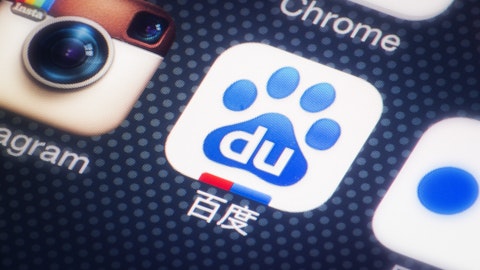The unit economy in our operations in key cities is also improving, because we continue to scale out and improve the order cost — the cost efficiencies. Robin has mentioned, our rides continue to grow in the past few quarters and also each car now provide 15 rides every day in some Tier 1 cities. Apollo Go today is becoming — recognized as a reliable and efficient way for daily commute. Overall, Apollo Go our measures be, we aim to achieve the unit economy in key cities before we expand to more cities. I think, just a summary, all of this impact to our cash flow and the P&L is manageable, and we have the patience. Thank you.
Kenneth Fong: Thank you. It’s very clear.
Operator: The next question comes from Lincoln Kong with Goldman Sachs. Please go ahead.
Lincoln Kong: Thank you, gentlemen. I want to ask about our sales of advanced chips to China, because we have seen recently a lot of press report around US chip restriction against China. So we wonder how you are seeing these restrictions impacting your ability to grow the business by AI Cloud, the autonomous driving and lastly, wider our AI business? So, could you also remind us, our business that’s the most is depending on the advanced large AI chips and if there’s any way, we’ll be able to manage this with the master chip capability? Thank you.
Robin Li: Thank you, Lincoln. You’re right. This is a hard topic to reason to actually. So, the short answer to your question is that, we think the impact is quite limited in the near future, and here are the reasons. So first of all, as of today, a large portion of our AI Cloud business and even whether AI business does not rely to much on the high advanced chips. And secondly, for the part of our business is that need advanced chips, we have already started enough in hand actually to support our business in the near term. Thirdly, there were some alternative to the restricted chips and we have the technologies to use these alternatives to achieve almost the same effectiveness and efficiency in our AI Cloud and the weather AI businesses.
Last, but not least, automotive chips are not on the prohibited list. So this means that in the near future, in-vehicle computing is not affected. So when we look at the mid to longer term, we actually have our own developed AI chip, so named Kunlun. Actually, we already started to use Kunlun chip to support some large-scale AI computing tasks internally. We also use Kunlun to serve external customers already. So because we have full stack AI capabilities from chips to AI frameworks to foundation models and then to application software, so we can achieve much higher efficiency as we optimize AI tasks from end to end. So let me give you some examples. By using our Kunlun chips and large language models, the efficiency chip to perform text and image recognition talks on our AI platform has been improved by 40% and the total cost has been reduced by 22% — 30%.
There are more cases like this in a quality inspection in our smart manufacturing projects and image recognition in the smart city products and so forth. So as our business grows, we believe our end-to-end capabilities will gain us even stronger competitive advantages. For the core chips, so we expect to see more auto force, including core chips to be manufactured in China in the future. So as China’s intelligent driving market continues to develop rapidly. So this means that supply chain in auto industry may become more and more independent unless we’re in the imports. So once again, I want to emphasize that Baidu has built a very strong R&D team. We keep introducing cutting-edge technologies to the market, and we help users and customers to use these technologies to improve efficiency.





